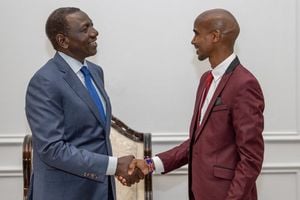As usual, financial problems dog teams at Cup of Nations
What you need to know:
- Zimbabwe and DRC players stage go-slow in Gabon over unpaid bonuses owed to them
- Financial problems have again caught up with teams in this year’s edition of Africa’s premier national football team competition.
IN LIBREVILLE, GABON
Those “recurrent African problems” that have dogged our national football teams are yet again cropping up here.
Financial problems have again caught up with teams in this year’s edition of Africa’s premier national football team competition.
Already, players from the Zimbabwe and the Democratic Republic of Congo national teams have staged a go-slow as they demand their hard-earned allowances and match winning bonuses from their respective national federations and governments.
The Zimbabwe case was more daring. The Warriors squad boycotted a send-off dinner ceremony which was to be attended by top government officials and officials from their national federation at a four-star hotel on the eve of their departure to Gabon in protest against delayed payment of allowances and appearance fees.
Each player was pressing for up to Sh500,000 in appearance fees per game and Sh30,000 in allowances per day.
A compromise was later reached between the two parties and the team left for Gabon.
“We have partly paid them, they even have some of the monies now.” Zimbabwe football federation’s communications manager, Zolisani Gwesela told Daily Nation Sport in Franceville on Sunday, during the contest between the Warriors and Algeria, which ended 2-2.
Zimbabwe coach Callisto Pasuwa has however refused to comment on the subject at press briefings.
Then came the Democratic Republic of Congo.
The Leopards contingent downed their tools upon arriving in Oyem on Sunday and refused to train until money owed to them is settled.
Team captain Youssouf Mulumbu announced the go-slow via video on social media, prompting their government to dispatch dozens of senior officials in an attempt on mediation, which proved successful.
Interesting to note however, is the fact that their government managed to urgently secure funds to fly a high-powered delegation to Gabon to resolve the stalemate rather than solving the crisis in the long term. The Congolese stars, reduced to 10 men, later reassembled and went on to beat Morocco 1-0 in their Group C match in Oyem.
Cameroon have not been left out either. Up to seven players, including Liverpool star Joel Matip, opted out of the squad for this year’s tournament. While explanations to the effect that the players were keen to fight for positions at the European-based clubs were advanced, the chief reason, according to insiders, appears to be money.
Uganda have also had challenges with finances, leading to earlier delays in departing for Tunisia and Dubai for training camps. The delay prompted Uganda’s parliament to contribute funds for the team.
For the record, these challenges have been recurring in the past as long as we can remember. The most notable example is that of respected former Nigeria coach, the late Stephen Keshi, who died last year. The Nigerian government owed him salary stretching back six months.
Let’s just say African players don’t trust their administrators and Government officials one inch to deliver on their financial obligations.





